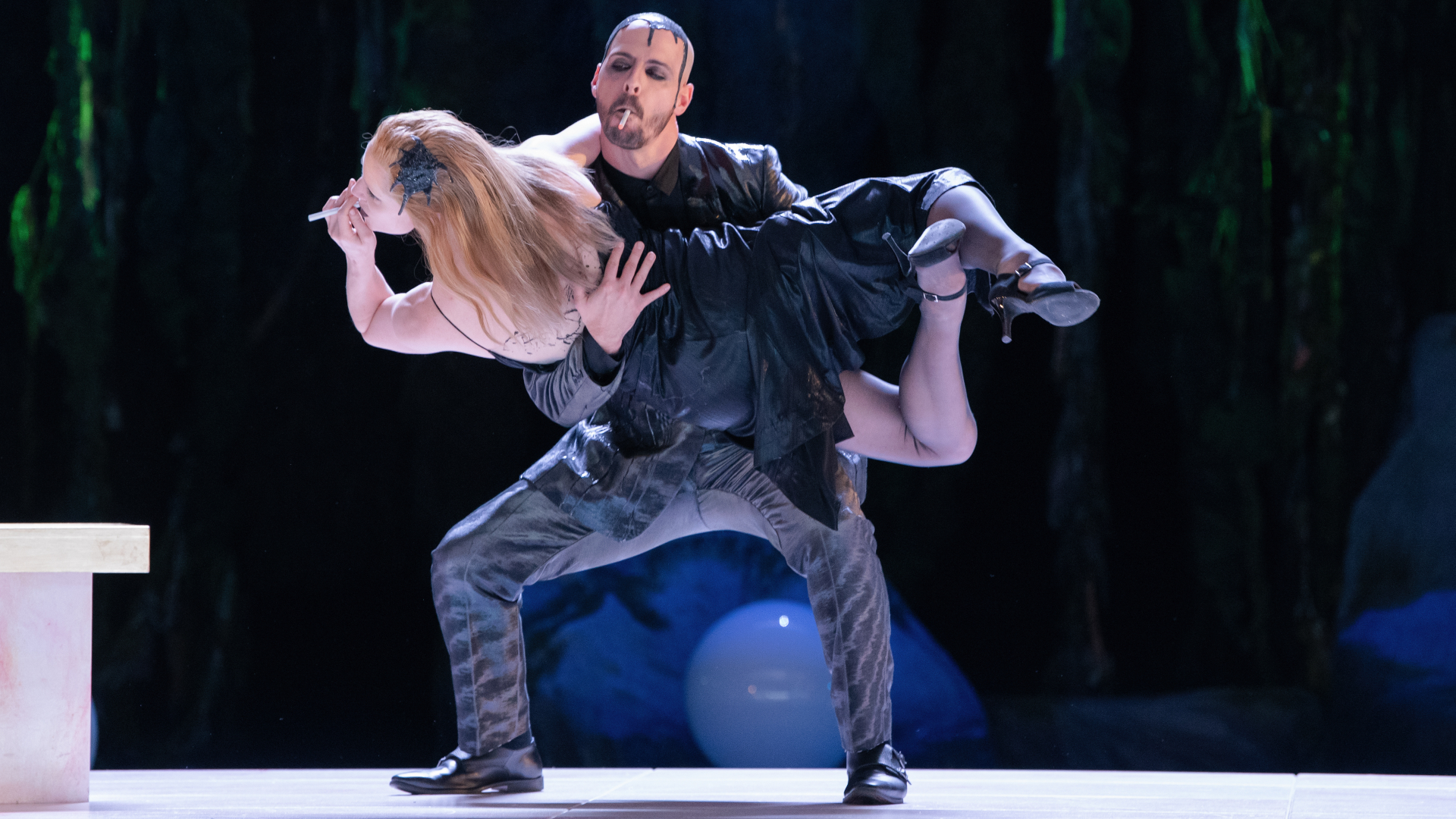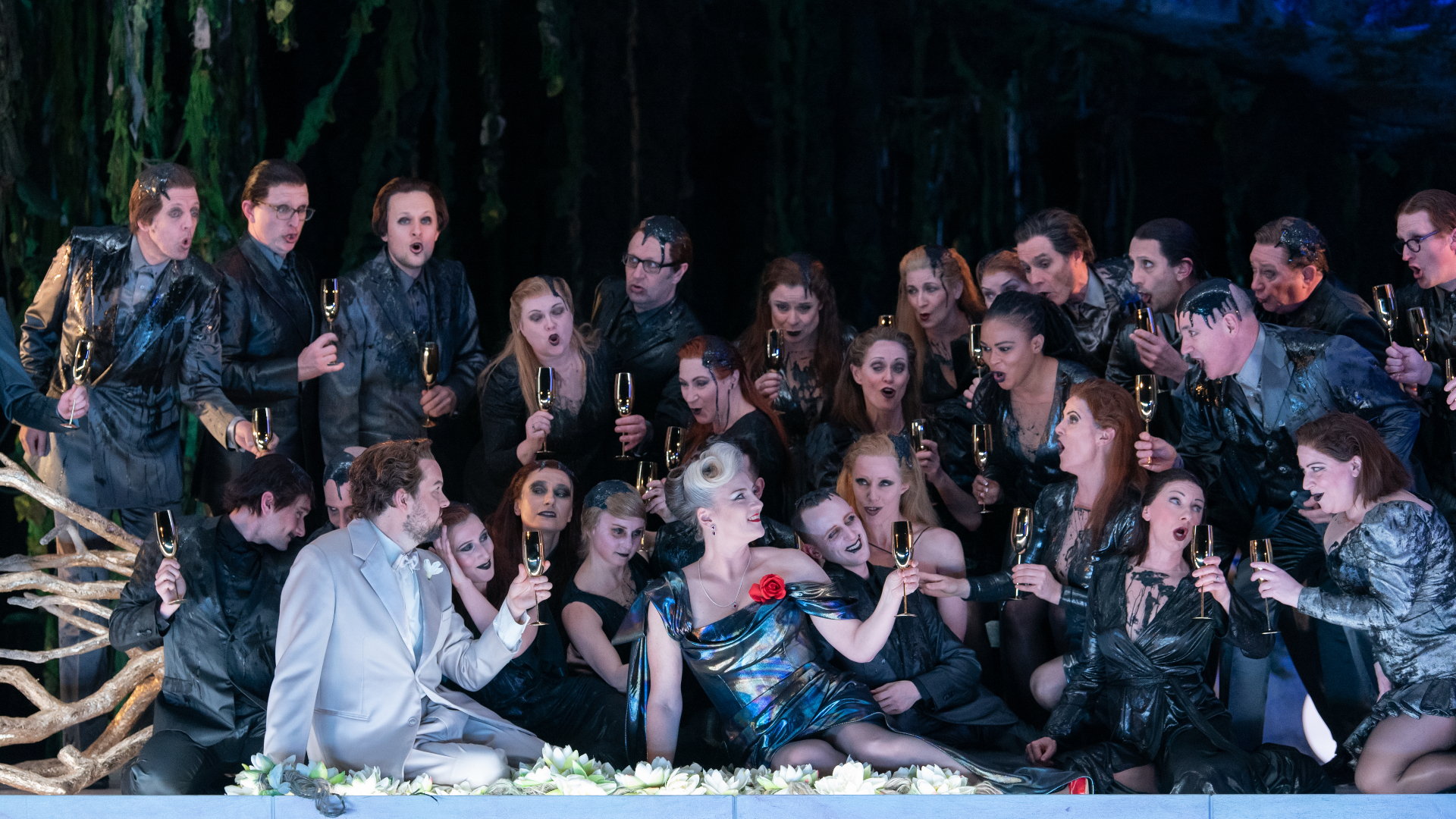I danced with a live orchestra and Apple Music Classical's Dolby Atmos won't compete – but that's OK. Nothing can
Apple's delicate way with Spatial Audio still excites me, but it will never beat the real thing – here's why

Now, how's this for irrefutable proof that your TechRadar team wears many colorful hats? I just spent nine weeks rehearsing and performing in Rusalka at the Royal Opera House, as an aerialist and dancer – that's me, top right in the image above – with a live orchestra in front of me. And my audio-loving ears are still yearning for more.
Why am I telling you this? Because an Apple Music Classical app arrives on March 28, complete with Apple's own excellent Spatial Audio side-sauce, and I am worried the body politic might think, "Oh, classical music that's just like being at an expensive recital? Great! Cancel the opera tickets darling, we'll buy a HomePod 2 instead!"
Don't do that. Well, actually, buy as many of the best wireless speakers as your heart desires (and if you're an iOS user, our HomePod 2 review should be your first port of call to make that decision), just don't do it because you assume it will replace an in-person authentic experience. It won't.
I cannot impress upon you how much more emotional and alive you feel in a room filled with live classical music over a canned recording (even from one of the best music streaming services in high quality and spatial audio), and how readily even the secondary, trifling sound wave particles thrown up by the experience transfix its audience. The rustle as a cellist turns a page; the intake of breath from a first violinist; the very movement of air through space… however good Apple's incoming Classical app is, it simply can't compete. And also, that's a good thing…
Listen for the unknown

Have you watched Tár yet – specifically the part where Lydia (if that's even her name) explains her ability to hold time verily in her right hand? That's a huge part of what I'm talking about here. In my case, should our luminous conductor Semyon Bychkov have failed to move his pointer and palms, ne'er a delicate passage of music could have emerged from the Opera House pit below me.
Isn't that exciting? The idea that one incredibly talented individual could affect a performance so dramatically, and indeed stop it entirely if he felt so moved?
Ultimately, in that split second between seeing the maestro invoke the down-beat more urgently, and hearing the full force of the string section in response (that I might dance to it), there is magic.
Get daily insight, inspiration and deals in your inbox
Sign up for breaking news, reviews, opinion, top tech deals, and more.
The great dancer and choreographer Martha Graham is quoted as saying: "There is a vitality, a life force, a quickening that is translated through you into action, and because there is only one of you in all time, this expression is unique. And if you block it, it will never exist through any other medium; and be lost."
Thus, if even one member of the Rusalka orchestra doesn't do, the entire experience as composed by Antonín Dvořák (and premiered in 1901 in Prague) cannot be.
Good vibrations

Another factor is hearing music in situ versus your regular listening chair or through your cans – and I'm not just talking about the emotional benefit of a shared experience. Did you know that human bodies absorb sound? An orchestra sounds louder in an empty house than when said house is filled with the paying public. Despite writing about audio for a living, this still surprises me when I perceive it.
At the start of Rusalka, I was suspended above the stage. On opening night, I revelled in how much softer and yet broader, rounder and more resonant the overture sounded when played to a packed house, darting with greater agility around my ears and vibrating through my body as I moved.
In the same way that hi-fi devotees and audiophiles often "treat" their listening rooms with soft furnishings and rugs to deflect nasty reflections and sonic articles, an opera simply needs an audience to come alive.
And opera truly is a place for audio purists. The conductor is our only click-track; there are no mics on singers and no in-ear monitors. There is foldback (rear-facing loudspeakers side of stage, to allow performers to better hear the music coming from the pit almost directly below them) but it's the natural, unmodified acoustics that will have you hooked as a visitor.
However noble its aims and cutting-edge the recording, mixing, packaging and decoding processes involved in your chosen digital music streaming service (and make no mistake, Apple Music is at the top of a highly competitive pile here) even the highest-quality file cannot emulate this experience. Yes, even if you've meticulously placed your speakers for the best sound.
But I don't mean to do Apple Music Classical down before its launch, even though you will need an internet connection to enjoy it (so, no offline listening). I'm a long-term advocate of Apple Music's Spatial Audio with Dolby Atmos offering – most notably the exceptional Apple Music Sessions last summer.
Because of this, I'm very excited to hear it. But even if I can pick out the various sections of the orchestra as I turn my head to allow them in (the cadence of the flute underpinned by the glorious side-stage tuba), it cannot begin to challenge the real thing.
Dolby Atmos still excites me – in a different way
Look, I am far from a 'keep music live' elitist. The Royal Opera House offers fans the chance to stream its performances or watch them live in cinemas and this is an excellent advancement, giving far more people a chance to enjoy operas that sell out quickly – or that they couldn't otherwise afford.
We live in a digital age and, for those unable to attend live performances, I wager Apple Music Classical will provide one of the best options out there for recreating an audio-only emotional classical music experience, particularly when using other products in Apple's ecosystem – including the AirPods Max and AirPods Pro 2 from an Apple source device.
But as good as the live experience? That it will never be – not that this was ever Apple's claim, you understand.
No two live performances are the same. What if a soprano treats you to the performance of her entire career that particular night, for whatever reason? What if, from your unique seat in the auditorium, your ear catches certain chorus members' vocal parts more readily than it otherwise might – and you detect something completely new in an opera you previously thought as familiar as the back of your hand? What if the conductor changes the timing just slightly and gleans more dynamic bass clout from the orchestra than has ever been heard to date?
Myriad variables can alter and sonically charge a performance. Human error is the biggest of these, and we should embrace that – because to err is to be human.
That all goes out the window when you're listening to a recording. You know it'll all be OK in the end. You know you're getting the full ticket; pre-treated, mixed and boxed for your ultimate enjoyment. A sound engineer has already done their very best with the stems. By its very definition, it's a wrap; it's in the can.
There's nothing wrong with that. I'm all for Apple Music honing in on classical music and trying to optimize its sonic brilliance for its loyal subscribers (and I count myself within that number).
It's just not live theater. And I hope we never forget that.

Becky became Audio Editor at TechRadar in 2024, but joined the team in 2022 as Senior Staff Writer, focusing on all things hi-fi. Before this, she spent three years at What Hi-Fi? testing and reviewing everything from wallet-friendly wireless earbuds to huge high-end sound systems. Prior to gaining her MA in Journalism in 2018, Becky freelanced as an arts critic alongside a 22-year career as a professional dancer and aerialist – any love of dance starts with a love of music. Becky has previously contributed to Stuff, FourFourTwo and The Stage. When not writing, she can still be found throwing shapes in a dance studio, these days with varying degrees of success.